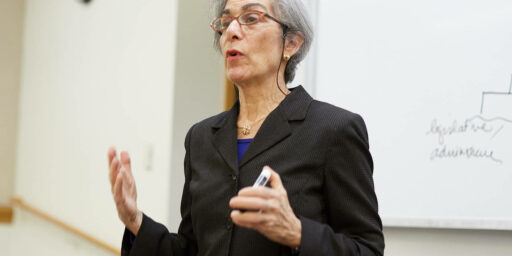Blogging and Professional Ethics
When professors blog, they send signals to their students about their attitudes. Where do we draw the line between free expression and unprofessional conduct?
Following a link from a comment thread in Charli Carpenter‘s vicious but provoked piece attacking a certain controversial conservative blogger who teaches at a West Coast community college, I saw Scott Kaufman‘s February piece lambasting said blogger for festooning his blog with photographs of scantily clad women.
Imagine, for a moment, that you are a female in one of his classes who is having trouble with her assignment. He tells you to come talk to him during office hours, and when you do there are posters of women in various states of undress covering his walls. How comfortable would you feel? Would you consider his office a safe place, or would you be worried about where his eyes wandered when they broke contact with yours?
I only ask because a blog functions somewhat like a virtual office: it is a private space that the public, including students, can access. It functions as an extension of your professional persona.
[…]
I cannot, however, understand the rationale behind plastering the walls with images of objectified women approximately the same age as the students you teach. This deliberate decision to decorate with photographs that stimulate him would be the equivalent of the seventeen posts Douglas has devoted to what he himself calls “fawning“ this year alone.
“If you don’t like my fawning,” he writes in that post, “don’t read the blog.”
Which is fine for readers of his blog—but what if you were a financially strapped female student in his course at Long Beach City College? What if you were searching for course materials and stumbled upon American Power—a blog written by the very person you needed to impress—and clicked through only to find countless images of objectified women and your professor complaining that the copyright holder of others prevents him from saving and displaying more? How comfortable would you feel sitting their in during office hours?
Having started this blog several months after my last teaching stint, I’d never considered the implications of Rule 5 postings on it on prospective students. But that actually brought a related thought. So I posed this question in Kaufman’s comment thread:
What’s worse: Female students realizing that their prof — horrors — enjoys ogling beautiful women about their age? Or liberal students realizing that their prof thinks the likes of Spencer Ackerman is a communist?
Should profs not have blogs in which they express personal opinions, thus inevitably creating a chilling effect on some portion of their students?
And got this thoughtful reply:
Disagreement is part of academic discourse, and can be dealt with in the classroom; ogling, on the other hand, is a voyeuristic power trip that the student, male or female, can’t opt out of. Once they know a professor values them not for what they think, but for how they look, the classroom dynamic’s forever spoiled.
That strikes me as reasonable in theory. But I’m not so sure.
In my teaching days, I was pretty careful about keeping ideology out of the classroom. Indeed, since I mostly taught students who were pretty conservative (it was the South, after all) I frequently played Devil’s Advocate for all manner of things I didn’t agree with just to challenge their views and generate a discussion. (I pretty much took whatever side of the argument wasn’t getting its due.)
Of course, I kept my ogling in check to the best of my ability, too. But one presumes that my hot female students were at least intellectually aware that, since I was an open heterosexual, I found them attractive. Did they therefore think I viewed them as mere objects?
Or, is signaling that one enjoys looking at women in bikinis by posting that fact on the occasional blog post a degree of objectification that removes the benefit of the doubt? I don’t do much of that sort of thing at OTB and would probably have done even less of it had I been teaching undergraduates at the time. But I’m not sure it’s a hanging offense.
Conversely, writing a very charged political blog, wherein you display contempt for people who hold fairly mainstream views on the other side of the aisle, would seem to send a much stronger signal of which ideas you value and which you hold in contempt. Doesn’t that have a chilling effect on the main thing that you’re trying to do? Much less as a political science instructor?







“vicious but provoked piece”
It seemed like fairly mild satire to me but maybe I’ve become inured to viciousness from watching too many John Cleese movies. And what heterosexual male doesn’t enjoy looking at photos of bikini clad women. There are some notably left wing academics like Krugman or the late lamented Tony Judt so I see no problem with openly conservative academics. They of course have a bit of a problem in that some of the set of beliefs they embrace are to some extent antipathetic to the way they earn their living but that’s another matter.
I dislike dishonesty and would generally prefer people to be clear about their likes and dislikes, their prejudices and presuppositions. The more data the better.
That said, you think professors have a problem? I write books for kids aged 9 to 16. There isn’t just an assumption of chastity, there’s an assumption of some kind of secular sainthood. This is hard for me to pull off given that, as people who know me or read my comments can testify, I’m a complete asshole.
Every time I do a school visit in live in fear that I’ll drop an f-bomb. Or blurt out my true feelings about school. Or hit on one of the teachers. Or God forbid, show up reeking of pot smoke with a bottle of Scotch in one hand and a cigar in the other.
Fortunately that last thing has only happened a couple of times.
@Joe: The point of the essay, rather clearly, was that she considered the person in question a rather pathetic figure, professionally and personally. That she used satire to convey that doesn’t make it less vicious; indeed, it may make it more so.
James Joyner says:
Wednesday, August 18, 2010 at 15:23
“That she used satire to convey that doesn’t make it less vicious; indeed, it may make it more so.”
If this is your definition of a “vicious” satire Jim, all I can do is suggest you read or perhaps re-read some serious practitioners of the genre.
Conversely, writing a very charged political blog, wherein you display contempt for people who hold fairly mainstream views on the other side of the aisle, would seem to send a much stronger signal of which ideas you value and which you hold in contempt. Doesn’t that have a chilling effect on the main thing that you’re trying to do?
Not in the least. I make my politics plain to my students, and tell them that my job is teach them how to argue, not what, because I’d prefer to argue with smart, rational people instead of Donald Douglas. (Lest you think I’m just saying this, let me just say that’s a general pedagogical principle with me, be it concerning politics or the mechanics of film.) As I said in the post, I don’t think his wanton display of nearly nude women to be a hanging offense–it can’t be, because he’s abusing his tenure to do it–only that it should be.
That’s a very Germanic view of the professoriate. And it may well be right. I tended to err on the side of mystery. If I ever re-enter the profession, of course, that option will have been foreclosed.
That others are more vicious doesn’t make this not vicious. I don’t offer it as a criticism of Carpenter, merely as a shorthand for what’s an otherwise very uncomfortable exchange.
“That others are more vicious doesn’t make this not vicious.”
Jim, this was a slap with a wet feather. Southern sensibilities are apparently more frageelay than I thought.
Humans are constantly aware of the attractiveness of the people around them. James follows the social norm, knowing when to pretend otherwise. I didn’t really follow the links, but it seems someone decided to exceed social norms. Humans address such divergences from convention a number of ways. Social sanction is one. That’s to be expected too.
So, let’s all stop worrying about objectified women and go watch Top Model(*)
* – I feel the need to mention that I don’t, actually
This is a fascinating issue actually. I long ago decided that I would not even try to pretend I didn’t have strong opinions. But I always make it a point to invite and encourage students to push back and challenge me. Indeed, I seek it out. You can see it in people’s faces when they disagree with you, and it they are too reticent to say something, I’ll walk right up to them and say, “I can tell you disagree. Let’s talk about it.” Does that create a certain amount of tension in a classroom? Yeah, of course. But tension in a classroom is not necessarily a bad thing. Students ought to be at least a little uncomfortable, I think, or you’re not doing your job right.
About the oogling issue. Look, it depends on the age of the students. Obviously a high school teacher needs to be very careful to maintain a safe atmosphere for students. And maybe, that is is even true for someone teaching 1st year students. But even the most sheltered college students by the time they get to be 19 or 20 are more experienced and savvy than a lot of these arguments given them credit for. Which is not to excuse inappropriate conduct or sexual harassment, but just to note that the students know that their instructors are human and share with them all that goes along with that reality.